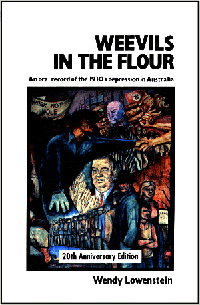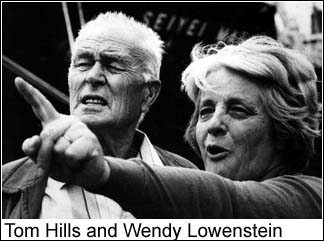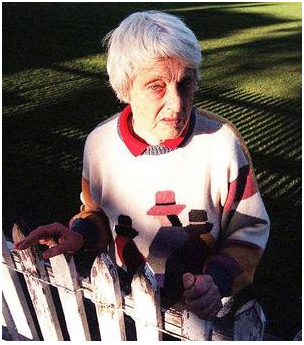Wendy Lowenstein: 1927 to 2006
Video Tribute to Wendy (part 1) (Part 2) (Richard Lowenstein 11 November 2006)
Tribute by Mark Gregory (October 2006)
 My
memories of Wendy have been reinforced as I’ve pored over collections
of folk magazines and books over the past few years 'researching'.
My
memories of Wendy have been reinforced as I’ve pored over collections
of folk magazines and books over the past few years 'researching'.
I first met Wendy in the early 1960s when she was the powerhouse behind Australian Tradition magazine that ran for 10 years (1964-74) and published hundreds of Australian songs including many being written at the time by songwriters like Clem Parkinson, Glen Tomasetti, Merv Lilley, Bill Berry, Don Henderson, Gary Shearston, Mike Leyden, Phyl Lobl, Ken Mansell, Bernie Besesparis, Harry Robertson, Chris Kempster, Dorothy Hewett, Denis Kevans, Mona Brand, Lyell Sayer and many others.
Sometime in the late 1960s the US singer Barbara Dane wrote to Wendy as editor of Tradition asking for Australian songs about the Vietnam War. Because of this there are eight Australian Songs in what is now an expensive collectors item The Vietnam Songbook. So famous is the book that it has its own website at http://vietnamsongbook.org/
I subscribed to Tradition when I was working in Albury in 1966 and carried all the volumes to London for the years I lived there through the 1970s. A few years ago I got Wendy to send me copies of Tradition that I'd missed and the collection proved an invaluable resource.
Likewise her books. Weevils in the Flour has been a classic for close to 30 years. Wendy wrote in the introduction to this oral history of the depression in Australia:
'I have not begun to plumb the depths of fear, confusion, despair and frustration, or to explore the decline in personal relationships, the loss of human dignity and zest for life, the wounds to the spirit, and the humiliations which go with long term unemployment.
 People ask: 'Was it really so bad? Here? In Australia?'
In fact, all the evidence shows that it was far worse than these accounts
reveal. I missed much because
I came along forty years later, when the survivors had put the worst behind
them, preferring to remember the better times, the kindnesses rather than
the betrayals.
But even had I come along in the middle of it all, there was much I could
never have been told, because people do not talk easily about their deepest
hurts.
Too often the unemployed blamed themselves rather than society for what they
saw as their failures, for the shifts and stratagems by which they were forced
to survive'.
People ask: 'Was it really so bad? Here? In Australia?'
In fact, all the evidence shows that it was far worse than these accounts
reveal. I missed much because
I came along forty years later, when the survivors had put the worst behind
them, preferring to remember the better times, the kindnesses rather than
the betrayals.
But even had I come along in the middle of it all, there was much I could
never have been told, because people do not talk easily about their deepest
hurts.
Too often the unemployed blamed themselves rather than society for what they
saw as their failures, for the shifts and stratagems by which they were forced
to survive'.
Many historians are scathing about oral history but Wendy was typically forthright about her view:
'There is nothing new about oral history In fact, for the greater part of man's existence all history, all law, all knowledge has passed on through the oral tradition, often in conjunction with song and dance. Today the tape recorder gives new life to an oral tradition; by allowing the voices of the past to be heard directly it enables us to know what life was like for ordinary men and women. This is of particular importance since written history has largely been the story of elites, written by winners'.
Manning Clark (the ‘neo-hists’ will shudder at the mention of his name!) wrote of the book in the forward:
'It has often been said that the one thing lacking in the books on Australian history is the voice of the people. Our history, it is said, has been seen only through the eyes of the oppressors and the gaolers, not through the eyes of the oppressed and the gaoled. By great industry, a display of commendable concern for the life of the people, and a faith in their capacity to create a better life for themselves, Wendy Lowenstein has made this most comprehensive collection of the people's memories about what it was like to live in Australia during the depression'.
 With veteran wharfie Tom Hills Wendy co-authored 'Under the
Hook', an oral history of Melbourne wharfies. 'Under the Hook' was republished
in 1989 with extra chapters
added during the 1998 Patrick dispute in a section called 'MUA here to stay!'
With veteran wharfie Tom Hills Wendy co-authored 'Under the
Hook', an oral history of Melbourne wharfies. 'Under the Hook' was republished
in 1989 with extra chapters
added during the 1998 Patrick dispute in a section called 'MUA here to stay!'
Robin Gollan wrote in the forward of the updated edition:
'The wharfies have repelled many attempts to break down their working conditions and to render the Union toothless. This year saw one of the most elaborate conspiracies between the Commonwealth government and some of the employers to destroy a Union in the history of Australian industrial relations. The skill of the Union officials and the courage and discipline of the working men and women won out against the cynical (and probably illegal) tactics of the government.
From afar I, like hundreds of thousands of other people who prize the democratic institutions of this country, watched with pride and admiration the way in which the workers fought the battle. Now Wendy Lowenstein in her interviews with participants has painted a picture of what it was like to be in the front line night and day for months on end. I thank them'.
In the new edition Wendy published a poem she wrote about the dispute called The Telephone Tree, she emailed it to me and I put it on the MUA centenary CD With These Arms in 2003. It ends:
 Quickening, the tree sprouts buds,
Quickening, the tree sprouts buds,
flowers, tendrils, weaves a net,
trawls seas and docks,
Brings an Indonesian wharfie
and another from LA
A Japanese bloke yet,
to say, hold the line,
Hands off the MUA.
On the tree,
burgeoning flowers of solidarity,
thorny twigs of resistance,
strong stems of disobedience
and seeds of victory.
Alight with love,
strong in struggle,
two old women (with comrades)
the next and
not-to-be-forgotten day
defeat black cargo,
turn a train away.
You can read the whole of it online (and listen to it!) at http://unionsong.com/u073.html
It was Wendy and Ian Turner who set up the Victorian Folk Lore Society back in 1955. She also helped organise the first national folk festival back in 1967. Wendy was a pioneer in many fields, children's rhymes and songs (Cinderella dressed in Yella, with Ian Turner and June Factor, 1969 and Shocking, Shocking, Shocking, 1974), oral history (Weevils in the Flour, 1979, Under the Hook, 1982, Weevils at Work), In the 1970s Wendy got frustrated with the publishing industry that she pioneered self-publishing! She later wrote a book about it, ‘Self-Publishing without pain’, in 1999.
A most remarkable woman and part of the generation of activists who ensured the folk revival got off to such a vigorous start.
____________________________
Phyl Lobl broke the news to me that Wendy Lowenstein had died and she sent me an email with some of her memories of this extraordinary woman:
'As a young folk singer-songwriter accompanying Wendy by train to Sydney. Non-stop talk. I don't know what she made of me being so raw in political reality then, but my sympathies were in all the right places so I guess she forgave my political naiveness. I know I met Chris Kempster and experienced Balmain Pubs, Folk Clubs and the Fish Market. I think it was also on that trip that I met Dennis Kevans. She was definitely an influence.
I remember the parties at Wendy's and Werner's little house inPrahran. The 'vehement discussions'. She was so energetic but always had circles under her eyes. Wendy and Shirley were such a strong team on any committee.
Wendy used to tell the story against herself of someone who once said ‘How can such a nice bloke like Werner be married to such a bitch as you ?' 'Nice bloke ?' said Wendy. ‘He's not nice he's just quiet'.
I remember her telling the story of how she made the family each cook one night a week. One of the kids was not sticking to some other house rule so she said okay you stick to the rules or you leave. He did. So then her dinner roster was upset and she wished she had shut up. She could always laugh at herself.
I remember seeing Wendy and Werner off with tape Recorders camping gear and a four wheel drive. The Big Outback Collecting Tour. She generated energy, belief in people and belief that justice was worth working for and that people could deliver it. She made me believe it too'.
____________________________
Wendy died in Melbourne on 16 October 2006, survived by her husband, Werner, and their three children, Peter, Martie and Richard.
There is to be celebration of her life in the Trades Hall in Melbourne, appropriately enough on 11 November.
see also
Video Tribute to Wendy (part 1) (Part 2) (Richard Lowenstein 11 November 2006)
Tribute to Wendy Lowenstein (Richard Lowenstein 26 October 2006)
Sydney Morning Herald Obituary (Richard Lowenstein 26 October 2006)
The Australian Obituary (June Factor 27 October 2006)
Top